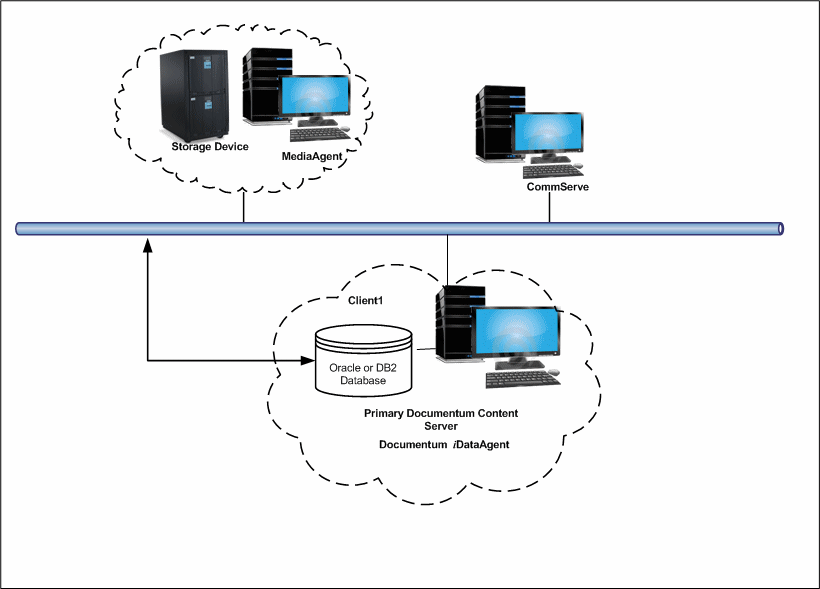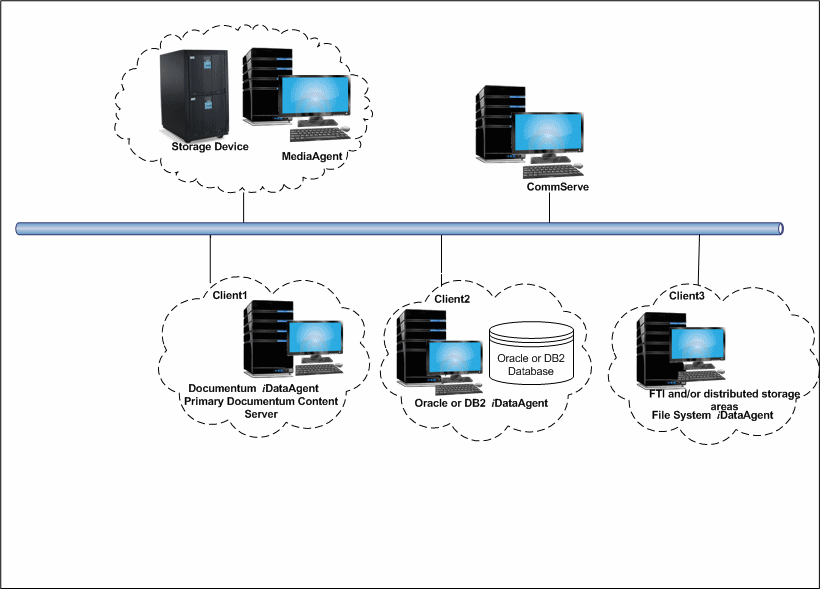As the following sections discuss, both single-server and distributed-server environments are supported by the Documentum agent.
Single-Server Environment
A single Repository is supported in a single-server, all-in-one configuration. When all Documentum components are installed on the same computer, the Documentum iDataAgent is sufficient to backup all components.
The illustration below depicts a possible example of how you could configure your environment. Keep in mind that configuration is entirely flexible and that you should set up your client computers and install your components according to your needs and available resources.
In the single-server configuration, the Documentum iDataAgent is installed on the same computer as the Primary Documentum Content Server to protect these components:
-
Storage Areas
-
Database (Oracle, DB2 or SQL)
-
Full-Text Indexes (optional)
Contrast a single-server environment with a Distributed-Server Environment.

Distributed-Server Environment
In addition to a single-server environment, a single Repository is supported in a distributed-server configuration. When the components are installed in a distributed setup, the File System iDataAgent or Database iDataAgents (Oracle, DB2 or SQL) need be installed according to the configuration.
The illustration below depicts a possible example of how you could configure your environment. Keep in mind that configuration is entirely flexible and that you should set up your client computers and install your components according to your needs and available resources.
In this configuration, these components are installed on three client computers as follows:
-
Client 1
This is the Primary Content Server where Documentum iDataAgent must be installed to protect the Storage Area residing on the server.
-
Client 2
On this computer, an Oracle or a DB2 or an SQL iDataAgent is installed to protect their respective database components.
-
Client 3
On this computer, the File System iDataAgent is installed to protect the following components:
-
Distributed Storage Areas
-
Full-Text Index
-
Contrast this with a Single-Server Environment where all Documentum components are installed on the same computer and the Documentum iDataAgent is sufficient to backup all components.

Key Features
The Documentum agent offers the following key features:
Full Range of Backup and Recovery Options
Documentum agent provides the flexibility to backup Storage Areas, files, and database (Oracle, DB2 or SQL) components in an online, zero-downtime backup environment. This is very essential since database data is very dynamic and is subject to constant changes.
You can perform a full backup for Storage Areas, Full-Text Indexes, and database (Oracle, DB2 or SQL) components. You can also perform an incremental backup of database and Storage Areas. The following section describes the backups that can be performed in different environments.
Storage Area Backup
The Documentum agent enables you to back up both local and distributed Storage Areas that are distributed across different computers. With both distributed and local storage areas, the File System agent should be installed on the client computers that are hosting the Storage Areas. Both full and incremental backup types are supported for Storage Areas. The first backup of a Storage Area is performed as a Full backup. Storage Areas can be backed up in a full Repository backup or as a separate backup.
Full-Text Index Backups
The Documentum agent enables you to back up Full-text Indexes. The File System agent should be installed on the client computers that are hosting the Full-text Indexes. Full-text Indexes can be backed up only in full backups. Full-text Indexes can be backed up in a full Repository backup or as a separate backup.
When backing up a Full-Text Index, it necessary to quiesce the Index Server to ensure consistent backups. For this purpose, quiesce and unquiesce scripts are required. These will quiesce and unquiesce the Indexer process in the Index Server during the backup operation.
These two sample scripts are provided in the <installation_folder\Base folder on the computer where the Documentum agent has been installed:
-
cvfti_startup.sh
-
cvfti_shutdown.sh
These scripts have to be modified to suit the environment prior to back up.
Database Online Backup
For Oracle, DB2 or SQL databases, in cases, when you cannot bring down the database to perform an offline backup, you can use the online backup method. Here, you can perform full or incremental backups when the database is online. For Oracle databases, it must be in ARCHIVELOG mode, especially when you want to perform a point-in-time recovery of the Oracle database.
You also have the facility the backup only the archive logs when the database is online. These logs can be applied to an online backup to recover the database to the current point-in-time.
You can also protect the non-database files and profiles using the File System agent.
Database Offline Backup
For Oracle, DB2 or SQL databases, when the database is shutdown and not available for use, you can perform a full backup of the database without the logs. This is especially used when the data is consistent and there are no transactions in the database.
Restore Levels
You can turn back the clock to a specific point-in-time and retrieve desired data. Restores can be run on-demand or can be scheduled to be run at a later point of time. When restoring data, the Documentum agent provides the facility to restore the data to the same path/destination on the client computer from which the data originated; this is referred to as an in-place restore. All restore levels provide the facility to restore data to a different directory on the client computer from which the data originated; this is referred to as an out-of-place restore to a different path/destination.
Efficient Job Management and Reporting
You can view and verify the status of backup and recovery operations from the Job Controller and the Event Viewer within the CommCell Console. You can also track the status of the jobs using Reports, which can be saved and distributed. Generate reports for different aspects of data management. Customize the reports to display only the required data and save them to a specific location in different formats. For example, you can create a backup job summary report to view the completed backup jobs.
You can schedule, generate and send the Reports via email without user intervention.
Scheduling
Schedules can be set up to automate data protection and data recovery operations. Scheduling jobs helps to ensure that operations required to manage the CommCell are automatically performed on a regular basis without user intervention, which is extremely beneficial in managing a CommCell.
Terminology
The Documentum agent documentation uses the following terminology:
|
Terminology |
Description |
|---|---|
|
Full-Text Index |
A Full-Text Index is an optional component. The Content Server maintains a Full-Text Index for all object linked in the repository. The Full-Text Index enables rapid search through a large collection of unstructured information. It searches for content and attributes in a given index and c stan be setup to run on multiple hosts. |
|
Offline Backup |
A backup of database objects performed while the corresponding database instance is shutdown and unavailable to users. |
|
Online Backup |
A backup of database objects performed while the corresponding database instance is running and available to users. |
|
Quiesce |
Prior to a backup, a quiesce operation must occur for a Documentum Full-Text Index. |
|
Repository |
A Documentum term that is often synonymous with Docbase. It is made up of the following components:
|
|
Storage Area |
These hold one or more file stores under the operating system file system. These are the actual content files that are stored in the Storage Area. A Storage Area is typically a file system subdirectory hierarchy of possibly millions of files in all formats. The Documentum agent currently supports backing up and restoring the File Store Storage Area type. Other types of Storage Areas (e.g., BLOB stores, Linked stores) are not supported. |
|
Unquiesce |
After a backup, an unquiesce operation occurs for a Documentum Full-Text Index. |